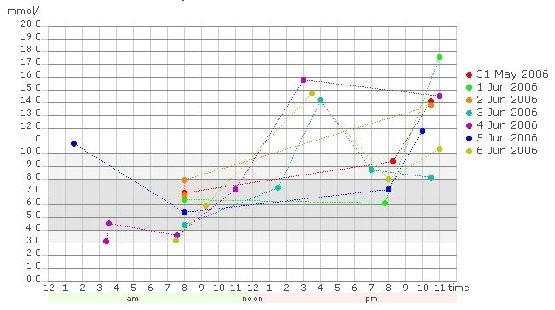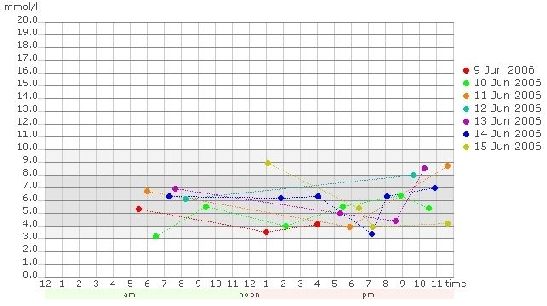Carbohydrates, High Blood Sugars, Diabetes: is There a Connection?
There is a strong connection between carbohydrates, high blood sugars and diabetes. Carbohydrates are the sugars your body needs for energy.
There are two types; simple and complex. Simple carbohydrates are in foods such as fruit sugar, corn or grape sugar and table sugar. They are single-sugar molecules. Complex ones are in the foods that contain three or more linked sugars. So carbohydrates create blood sugars and that's where the problems start for people with diabetes. Understanding more about the connection helps to control your diabetes...
Isn't it amazing how sometimes the obvious, like too many carbohydrates creates high blood sugars, just seems to be completely overlooked?
Craving something sweet?
In my story below I describe the steps I took to reduce my blood sugar levels. But I still like the taste of sweet treats. Do you find you are missing the taste of cookies or something sweet, like maple syrup, because you have to watch the sugar and fat you consume?
I discovered a completely sugar-free maple syrup, which is absolutely gorgeous (I use it in sugar-free cake recipes and as a topping for jelly (je-llo in the US) mmmm!)
I can definitely recommend the genuinely delicious taste of these fat and sugar-free treats created by a diabetic for diabetics. Josephs Lite Sugar and Fat-Free Cookies & Syrups
A Story About Carbohydrates, High Blood Sugars and Diabetes
read the latest update on this story
June 2006 - time for my HbA1C blood check. I'd been monitoring my daily blood sugar levels and it was not good news. After a meal my sugars would shoot right up and yet, too often, I would be woken by a hypo in the early hours of the morning.
Added to that my weight had crept up over the last couple of years, so I now weighed 28lbs more. 28lbs more than I should be! And yet I wasn't a great eater. Typically a day's meals consisted of a bowl of porridge for breakfast, granary bread sandwich for lunch and a cooked meal in the evening. No sweets; no snacks; nothing excessive at all.
Even so, it was a little upsetting, although no real surprise, when my results came through at an average 8.2 mmol/L (146.43 mg/dl)and my diabetic nurse expressed grave concern about my future health, if I didn't get my blood sugars under control.
"You've been extremely lucky so far" she said "Your diabetes has been controlled with just diet and tablets since 1982 - but if we don't get this sorted you'll have to go on insulin injections".
Well I didn't want that and sometimes we need a 'wake-up call'. This was mine. I needed to take action.
When I looked back over my diabetic records I realised that the only time I had really managed to get my sugars down to the ideal level was in 2002. And that was because my hubby and I went on the Atkins diet to lose weight. The Atkins promoted a low carbohydrate diet to reduce high blood sugars; good for diabetes.
Problem was, whilst on the diet I had constant diarrhea which was draining and stressful. Plus I didn't seem to be achieving the promised weight loss. So I came off it. But obviously, judging by my HbA1C levels for that period, it was good for my sugar-levels, I was just concerned about the 'side-effects' and how that might be affecting my health in other ways.
Solution Found...
Whilst doing the research for this website I've come across various supplements that looked promising for the diabetic who needs help. I've been very careful about the links I've put on this website for any products specifically for us diabetics, checking into the products and testimonials as much as I can.
Well, I decided that one of those products I'd found might be just what I needed.
I purchased my WSN Diabetic Supplement pack and, whilst waiting for it to arrive, started doing a bit more excercise, which really did not have much of an impact on my blood sugars.
Well the pack arrived along with a detailed e-mail describing how it worked and the changes I needed to make to my diet. That clinched it for me because it is a low-carbohydrate diet, which I knew from my previous experience would stabilise my blood sugars.
The only little bit of apprehension I had was whether I would get the same diarrhea problem I had had with the Atkins diet. Well, I'm glad to say, it is a little different to the Atkins and I was interested to see what happened.
The supplements supplied are designed to stimulate your cells to accept the 'fuel' of sugar, facilitated by insulin. So the intention was two-fold, reduce the sugar overload AND reduce my body's insulin resistance, effectively make it start working properly.
Now I must set the scene a little. Before I started with the WSN program my blood sugars ranged between 3.1 mmol/l (55.36mg/dl) and 17.6 mmol/l (314.28 mg/dl). Such wide swings - not good! I was taking one 4 mg tablet of rosiglitazone and four 5 mg glipizide tablets every day. And, as I said previously, I wasn't particularly overindulging in food.

Before I Started the WSN Diabetic Supplement Program
(The dark grey band on the chart is the safe range for controlled blood sugars)
I started the diet (the Remedy Direct people who supply the WSN pack even send regular newsletters with low carb recipes - how's that for service!) and the WSN pack on 9th June 2006. I kept a close eye on my blood sugars and adjusted my medication to compensate for the lowered blood sugars.
The difference I saw almost straight away proved the connection between carbohydrates, high blood sugars and diabetes. Some folks take longer to start stabilising. Everyone's different. Even with adjusting my medicine , I had a few hypoglycaemic (low-blood sugar) episodes.
I am now taking just the rosiglitazone and one glipizide tablet each day. That's a huge reduction in my medication already and my blood sugars are now averaging 6.3 mmol/l - I know that because I used the www.plasmaglucose.com website to keep a diary of my blood sugars.
This is the chart showing my new sugar levels and how they've altered (if you're interested in seeing how the web-based blood-sugars diary works have a look at www.plasmaglucose.com/xmascal to see the sample days I've published. (It may be a little slow to load because it's gathering the info from my records). You will only see a selection of my results).

And My Blood Sugars Have Improved Immensely
An additional bonus is I've started to lose weight - gradually - which is good, I've lost 5.25lbs since starting the program. I can honestly say I feel great, I've got so much more energy - you know how tired and listless you feel when your sugars are out of balance? Now, with the help of WSN, I've taken proper control of my diabetes.
Best of all there's no diarrhea!
Crave Carbohydrates?
Now, I appreciate that for some cutting out complex (or even simple) carbohydrates: potato, bread, rice, cereals etc. goes against the grain (excuse the pun), but my experience on both low carbohydrate diets has shown it is worth it.
The WSN supplements certainly seem to be working for me - keeping me in balance while my reduction in carbohydrate intake is doing a great job on my sugar levels. I suppose I'm fortunate I don't have any carbohydrate cravings. But the people who supply the WSN diabetic pack have even thought about that and have formulated a 'stop carbohydrate craving' supplement for anyone who is having difficulty.
Your Turn To Benefit?
I'd recommend you do your own research; check out what the Remedy Direct people have to say; check out the scientific evidence; what the medical profession say and the testimonials from other users; before you make up your own mind.
If you do go for it, I sincerely hope you get as good a result as I have.
Do come back and let me know how you get on and, perhaps, share your story with other visitors to this website.
I'm off do some more searching for low-carbohydrate recipes. I'll create a low-carbohydrate recipe page when I've found enough to share.
So bookmark this site and pop back occasionally to see what I've found.
Good luck,
Update
It is now two months since I started the WSN program and watching my carbohydrate intake. I am doing a bit of exercise as well, but I must admit not as much as I suspect I should be.
Initially one of the reasons I didn't go for long walks was because I was having problems with one of my toes - after a short distance it became very tender and made walking difficult.
That has cleared up completely! I can't honestly say if it was a touch of neuropathy or just too much weight (I was 12 stone - 168lb - when I started). I now weigh 11st 3lb - 157 lb - and I'm still going down.
My average blood sugars are currently showing as 6.0mmol/L (107.14mg/dl) so they've dropped a further 0.8mmol/L (14.28 mg/dl)! I'm not due for my next HbA1C tests until the end of November. I'll let you know how I get on when those are done.
I do slip occasionally - if you look at my latest published blood sugars diary you can see that I was a bit too high on 7 August - soared to 10.4! Think I miscalculated on the carb count that night!
November
Well, I've just had my HbA1c test results back. I went in to see my diabetic nurse and she told me the results. Then she said "You're looking very smug!" with a smile on her face.
I had reason to be! My HbA1c readings had dropped from 8.2 to 5.9 - I've never, since I was first diagnosed as a diabetic, managed to get that good a reading. And remember I'd also dropped three 5mg glipizide tablets per day, effectively a quarter of my daily dosage! So that was a double-whammy!
I've also found I have a lot more energy and inclination towards doing some exercise, so I've joined a weekly aquafit class.
For me, this carbohydrate-watching system has worked well. It doesn't suit everyone, but if you're having problems with weight gain and unstable blood-sugar levels, it's worth giving it a go. (But do remember to consult your diabetic team and explain why you want to make changes to your regime before you get started).
I've spent a lot of time working on an 86-age PDF book showing carbohydrate values for different foods (53 pages), 25 sample low-carb recipes, your own personal diabetic control goal planner and other useful info. You can get your copy free of charge, find out more and grab your copy here.



